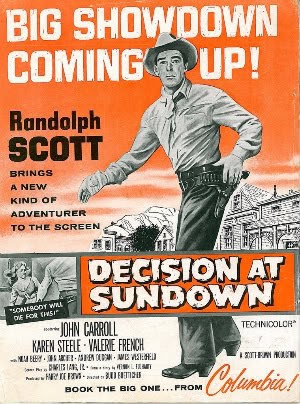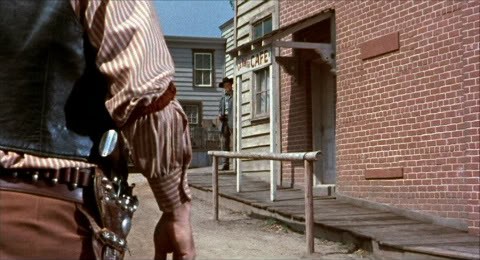
The Ranown westerns that I’ve looked at so far all made ample use of their Lone Pine locations and Burt Kennedy’s sublime scripting. Decision at Sundown (1957) is a bit of a departure in that those two ingredients are absent. In their place we get a tense town based tale from the pen of Charles Lang; as a result, it ranks lower than The Tall T, Ride Lonesome and Comanche Station. However, even a lesser Ranown film is a cut above most movies and, despite some shortcomings, Decision at Sundown has much to recommend it.
Once again Budd Boetticher and Randolph Scott offer up a story about revenge, but this one has an unexpected sting in the tail. Bart Allison (Scott) arrives in the town of Sundown with the aim of killing a man. The man in question is the local big shot Tate Kimbrough (John Carroll), and it just happens to be his wedding day. Given a situation like this it’s hard not to be reminded of High Noon, but the roles appear to be reversed here. Before long Allison and his friend Sam (Noah Beery) find themselves holed up in the livery stable and under siege from Kimbrough’s cronies. As the day wears on, a whole series of developments forces the viewer to radically re-evaluate his assumptions. Gradually, it is revealed that nothing is quite as clear cut as would seem to be the case at the beginning of the picture. The result of this is the shifting of the viewer’s sympathy as Allison and Kimbrough, both now stripped of friends and allies, stride out to face one another at the climax. The film ultimately highlights the pointless and self-destructive nature of revenge, but it also has things to say about the consequences of apathy and the need for communities to face up to their collective responsibilities. By the end, everybody involved has learned some hard lessons and nothing can ever be the same again for them.

Scott plays a highly complicated man in this film, a far cry from the basically decent and honourable characters one expects from him. Essentially, he’s a hollow man whose only reason for existing is to settle the score for a wrong he feels was done to him. At the end of the movie, when his own folly finally dawns on him, he seems a slightly pathetic figure. As the dishevelled and bewildered man shambles off the screen it’s hard not to feel pity for him. One suspects he has allowed his desire for a reckoning to consume him to the point that he no longer has a reason to go on; a sombre ending indeed. John Carroll is another of those personable villains that people Boetticher’s films. He may have strong-armed his way into a position of power, and held on to it ruthlessly, but there’s a lot to admire in the manner in which he swallows his own fear and doubts to finally face off man to man with Scott. The two female characters (Karen Steele and Valerie French) are of the typically gutsy variety favoured by the director, and Miss French gets to have a significant hand in the resolution of the story. Of the support players, Noah Beery and Ray Teal (who gets to play a good guy for a change) stand out, but there’s also some good work from Andrew Duggan as the amoral sheriff.
Boetticher moves things along at a fair lick once again, with not a shot wasted. The setting lends a claustrophobic feel to the events on screen, but this is also one of the weaknesses of the picture. Location shooting was able to paper over the lack of cash available for the other Ranown productions whereas the reliance on interiors here tends to emphasise it. However, there are still plenty of Boetticher’s trademark shots on view, such as the screencap above. Knowing that Sergio Leone voiced his admiration for the Ranown films, it’s easy to see where he got the inspiration for some of his own set-ups. While Charles Lang’s script offers an interesting alternative take on the usual Scott persona I feel that it still comes out second best compared to Burt Kennedy’s efforts, perhaps because it lacks the latter’s memorable dialogue.
Decision at Sundown is yet another excellent presentation on DVD from Sony. There’s no commentary track on this disc, but there is the usual short featurette on the film. Although it only runs for around six minutes, Taylor Hackford manages to provide a few interesting observations. So, even if the movie is a touch below the standard set by some of the other Ranown titles it’s still a fine piece of work. Seeing Scott in anti-heroic mode should be enough of a recommendation on its own.
I knew both Valerie French and Charles Lang. Valerie was under contract to Columbia at the time of filming. She was a smart, generous and grand person. Charles Lang was a minor leading man, and handsome as hell. I thought quite limited as both writer and actor. My understanding is that on this and Buchanan Rides Alone Burt Kennedy came in late for polish.
LikeLike
That’s an interesting piece of information – thanks, Barry.
LikeLike
Absolutely amazing scene in the saloon at the end when Scott as Bart Allison shows how mentally injured he is. Such a very unusual characterisation for Scott.but, boy, did he pull it off.
LikeLike
Yes, I find it hard to fully make up my mind on Decision at Sundown. There is a lot of good stuff in there but, taken as a whole, there are weaknesses too. Another one I really ought to revisit.
LikeLike
Because we expect plenty of outdoor action in a Randolph Scott western, this one seems odd because it is claustrophobic, psychological and almost all interiors. It was kind of unexpected, but this is one of my favourite Ranown westerns. I should also mention that I love filmed plays or movies that are heavy on dialog and character that seem like filmed plays so this “stage” aspect of the movie was easy to take – for me at least!
Definitely worth a second try. Besides, I like John Carroll a lot.
LikeLike
Yes, it’s certainly not a film that deserves to be written off. I guess the thing is we tend to view these Boetticher/Scott movies as a kind of block and thus raise our expectations. When we watch this one it’s hard not to make comparisons with the other collaborations and try to rate it based on the standards already set. In truth, that’s not an entirely fair approach and the movie really ought to be judged on its own terms.
LikeLike
Pingback: Ranown in Hi-Def | Riding the High Country